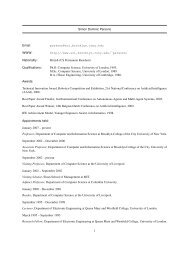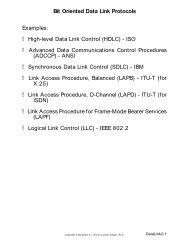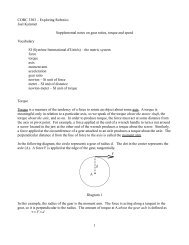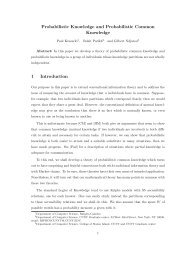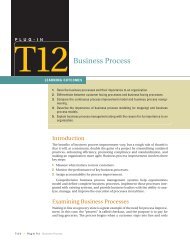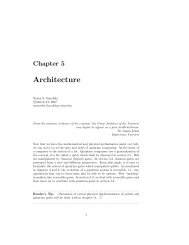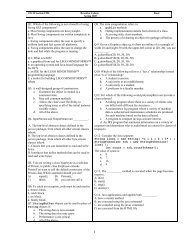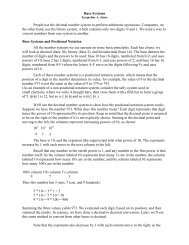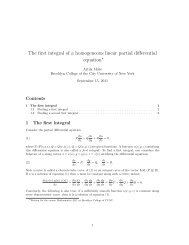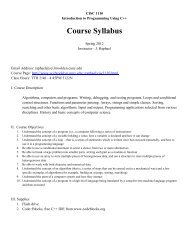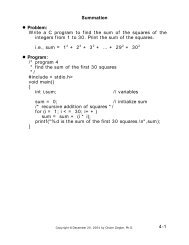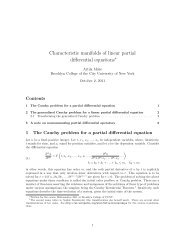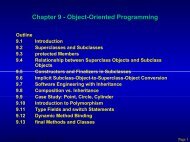*302 Greig and Others v Insole and Others 1977 G. No. 22461977 J ...
*302 Greig and Others v Insole and Others 1977 G. No. 22461977 J ...
*302 Greig and Others v Insole and Others 1977 G. No. 22461977 J ...
Create successful ePaper yourself
Turn your PDF publications into a flip-book with our unique Google optimized e-Paper software.
[1978] 1 W.L.R. 302 Page 56<br />
[1978] 1 W.L.R. 302 [1978] 3 All E.R. 449 (1978) 122 S.J. 162 [1978] 1 W.L.R. 302 [1978] 3 All E.R. 449 (1978)<br />
122 S.J. 162<br />
(Cite as: [1978] 1 W.L.R. 302)<br />
<strong>and</strong> all the resolutions of the ICC respectively referred<br />
to <strong>and</strong> set out in the press statement of the<br />
ICC issued on July 26, <strong>1977</strong>, are ultra vires <strong>and</strong><br />
void as being in unreasonable restraint of trade; <strong>and</strong><br />
(ii) a declaration that the new or proposed new<br />
rule 1 (e) <strong>and</strong> (f) of the rules of<br />
the TCCB governing the qualification <strong>and</strong> registration<br />
of cricketers in Test <strong>and</strong> *364<br />
competitive <strong>and</strong> county cricket <strong>and</strong> the<br />
new or proposed new<br />
rule 2 (c) (i)<br />
of the said rules are or would be ultra vires<br />
<strong>and</strong> void as being in unreasonable restraint of trade.<br />
Subject as aforesaid, I propose to grant to<br />
the plaintiff company in the second action. (i) a declaration<br />
that all the changes of the rules of the ICC<br />
<strong>and</strong> all the resolutions of the ICC respectively referred<br />
to <strong>and</strong> set out in the press statement of the<br />
ICC issued on July 26, <strong>1977</strong>, are (a) ultra vires <strong>and</strong><br />
void as being in unreasonable restraint of trade <strong>and</strong><br />
(b) an unlawful inducement to the cricketers referred<br />
to in the statement of claim in this action to<br />
break their contracts with the plaintiff company referred<br />
to in the said statement of claim; (ii) a declaration<br />
that the new or proposed new<br />
rule 1 (e) <strong>and</strong> (f) of the rules of<br />
the TCCB governing the qualification <strong>and</strong> registration<br />
of cricketers in Test <strong>and</strong> competitive <strong>and</strong><br />
county cricket <strong>and</strong> the new or proposed new<br />
rule 2 (e) (i) of the said rules are<br />
or would be (a) ultra vires <strong>and</strong> void as being in unreasonable<br />
restraint of trade; <strong>and</strong> (b) an unlawful<br />
inducement to the said cricketers to break their said<br />
contracts.<br />
I also propose to grant the plaintiffs in each action<br />
liberty to apply for an injunction.<br />
I make these observations in conclusion. Mr.<br />
Kempster, in his opening speech for the defendants,<br />
generously but correctly, acknowledged five positive<br />
beneficial effects which, on the evidence, have<br />
already been produced by the emergence of World<br />
Series Cricket as a promoter of cricket. First, as he<br />
said, it has offered the promise of much greater rewards<br />
for star cricketers. Indeed, it has gone further<br />
than this; it has offered secure, regular remunerative<br />
employment in cricket to more than 50 cricketers,<br />
in most cases for three English winter seasons,<br />
at a time when most of them would otherwise<br />
have had no guarantee of regular employment in the<br />
game. Secondly, it has already stimulated new<br />
sponsors for traditional cricket. Thirdly, it has<br />
brought back to the game in Australia several talented<br />
players. Fourthly, it, or the group of companies<br />
of which it forms part, has initiated a useful coaching<br />
scheme for young players in New South Wales.<br />
Fifthly, it has increased public interest in the game.<br />
For all these acknowledged benefits, the defendants<br />
have held the strong opinion that the effective<br />
monopoly of the ICC in the promotion of first class<br />
cricket at international level has been good for the<br />
game <strong>and</strong> that the emergence of World Series<br />
Cricket into the promotion field is bad for it.<br />
However, whether or not this opinion is correct has<br />
not been the question for this court. The question<br />
for decision has been whether the particular steps<br />
which the ICC <strong>and</strong> the TCCB took to combat what<br />
they regarded as the threat from World Series<br />
Cricket were legally justified. This long investigation<br />
has satisfied me that the positive demonstrable<br />
benefits that might be achieved by introducing the<br />
ICC <strong>and</strong> TCCB bans <strong>and</strong> applying them to players<br />
who had already committed themselves to contracts<br />
with World Series Cricket were at best somewhat<br />
speculative. On the other h<strong>and</strong> there were, as has<br />
been mentioned, a number of demonstrable disadvantages<br />
if the bans were to be applied in this way.<br />
They would preclude the players concerned from<br />
entry into important fields of professional livelihood.<br />
They would subject them to the hardships<br />
<strong>and</strong> injustice of essentially retrospective legislation.<br />
They would deprive the public of any opportunity<br />
of seeing the players concerned playing in conventional<br />
cricket, either at Test or at English county<br />
level, for at least a number of years.*365<br />
By so depriving the public, they would carry with<br />
them an appreciable risk of diminishing both public<br />
© 2011 Thomson Reuters.



